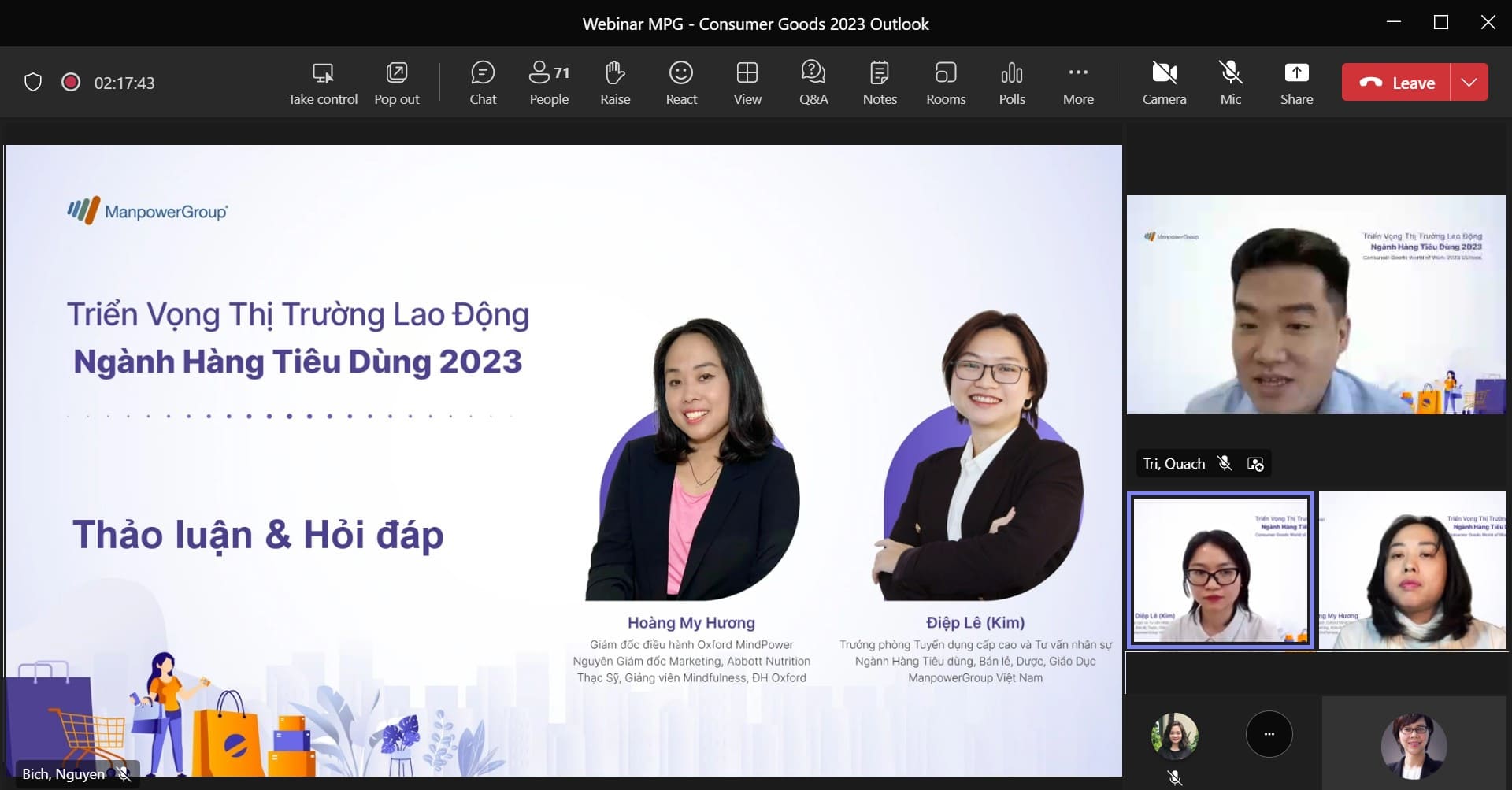ManpowerGroup Vietnam shared 7 key consumer goods trends at the "Consumer Goods World of Work 2023 Outlook" webinar by the end of July 2023.
Advanced technological disruption, along with the impact of the Covid-19 pandemic and global economic uncertainty, has been driving the development of the consumer goods industry to a new level, bringing more value, personalization, connectivity, and a better experience.
ManpowerGroup Vietnam, on July 31, organized the "Consumer Goods World of Work 2023 Outlook" webinar to update key trends that significantly impact the consumer goods industry's development and practical application in the consumer goods industry's human resource management.

The event had the participation of Hoang My Huong, managing director of Oxford MindPower, former Associate Marketing director, Abbott Nutrition, and Diep Le (Kim), team leader, Permanent Recruitment, Executive Search & Consulting Services, Consumer Goods, Retail, Pharma, Education, ManpowerGroup Vietnam.
According to ManpowerGroup's "Consumer Goods World of Work 2023 Outlook", brands are simultaneously adopting omnichannel and direct-to-customer (DTC) business models to strengthen customer relationships, improve consumer digital experiences, and leverage competitive advantages.
A report by KPMG indicated that the direct selling model's profit margin is projected to increase by up to 40 percent if traditional sales agents are omitted, and it is projected to reach a growth milestone of more than 20 percent by 2025, creating numerous positive development prospects and potential employment opportunities.
In the context of the rapid advancement of digital technology, businesses must actively optimize and diversify their consumer engagement strategies, focusing on enhancing the customer's digital experience.

According to Qualtrics, companies could lose $4.7 trillion annually if they fail to meet the digital experience expectations of their customers. Additionally, Gartner predicted that by 2025, the top 50 consumer goods manufacturers will have invested in a brand app using AI and embedded digital technology in the product.
According to Hoang My Huong, with the current hustle and bustle of life, consumers tend to expect fast and convenient forms of purchase in the style of "Life in the Express Lane."

Crunchbase's report revealed that in response to this demand, large retailers such as Amazon and Albertson's are piloting a Checkout-Free shopping feature that uses advanced sensors, cameras, and online payments, enabling customers to bypass the traditional checkout lines. Furthermore, McKinsey predicted that e-commerce would continue to grow in categories once dominated by brick-and-mortar retail. Fueled by evolving consumer expectations, increased competition, and technological advancements, e-commerce could account for up to 18 to 30 percent of grocery sales in many advanced markets by 2030, demonstrating the online business's high growth potential. A growing number of retail locations are “going dark” to address changes in consumer behavior. For example, brick-and-mortar retail locations are becoming distribution centers, and some restaurants are eliminating in-person dining rooms (Forbes).
Sustainable development is a current imperative in the enterprise development process. My Huong stated, "Sustainable development is a significant objective in the consumer goods industry, to create practical value for consumers, businesses, and the society/environment.”

“According to a report by Deloitte, 97 percent of industry leaders agree that becoming more environmentally sustainable is a top priority, and 54 percent of global industry leaders say sustainability is the most important innovation opportunity for the industry," she emphasized. “ESG strategy is occurring globally, targeting positive environmental and social values. In 2021, roughly 1,200 green startups focused on disruptive business models to fight climate change raised a record $90 billion, putting additional pressure on established brands to increase their sustainable development efforts.”
In addition to its remarkable growth, the consumer goods industry is experiencing a serious talent shortage due to the rising expectations of employees for businesses. Diep Le (Kim) shared, "The consumer goods industry has confronted numerous challenges in recent years. According to ManpowerGroup's Employment Outlook Survey Q2 2023, talent scarcity has reached its historic high within 17 years, with 77 percent of global Consumer Goods employers saying they encountered difficulties finding the skilled talent they need".

She stated that despite repelling plentiful challenges in terms of human resources, the consumer goods industry's labor market has still witnessed positive signals. In addition, the report indicated that the global employment outlook for the consumer goods industry would see an 18 percent increase, up 11 percent from the previous quarter and a decline of just 6 percent from the prior year. With the disruption of technological advancement, the demand for human resources with digital and green skills will increase soon, highlighting the importance of upskilling and reskilling for employees. To attract and retain talent over the long term, businesses must devise a critical strategy to improve employee skills, enhance work productivity, and promote the significance of the Employee Value Proposition (EVP).
Contact us to share insightful HR knowledge with various industries of the vast business network in Vietnam.
Please fill in the following form to download our full reports:
Email: inquiry@manpower.com.vn
Hotline:
Hanoi (Headquarters) : +84 24 3974 4574
Ho Chi Minh City (Branch): +84 28 3911 0950

